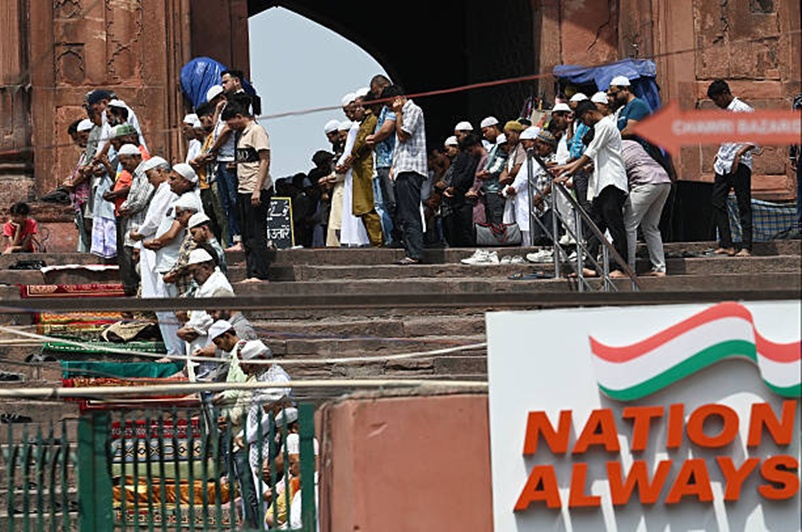New Delhi, May 5 (PTI) The Supreme Court on Monday said the pleas challenging the Waqf (Amendment) Act’s constitutional validity will now be taken up by a bench headed by Chief Justice of India-designate Justice B R Gavai on May 15 as the incumbent CJI will be demitting office on May 13.
As soon as a bench comprising Chief Justice Sanjiv Khanna and Justices Sanjay Kumar and K V Viswanathan assembled for the hearing, the CJI said, “There are certain aspects which you (Centre) dealt with, but that require clarification. I do not want to reserve any judgment or order at this interim stage. This matter will have to be heard on a reasonably early date and this will not be before me.”
CJI Khanna will be succeeded by Justice Gavai a day after his superannuation on May 13.
“We have not very deeply gone into the counter affidavit (of the Centre). Yes, you have raised certain points in regards to registration (of Waqf properties) and have given some disputed figures, that will require some consideration,” the CJI said.
“We would have loved to pursue your lordship (the CJI) as every contention has an answer. But, we cannot embarrass you because there is no time,” Solicitor General Tushar Mehta, appearing for the Centre, said while indicating the retirement of the CJI.
“It is painful to remind your lordship (about the retirement),” the law officer added.
“No no I am looking forward to it,” the CJI responded.
The CJI categorically said the Centre’s affidavit was exhaustive and it has dealt with most of the issues regarding the concerns expressed on the earlier date.
The CJI said some figures referred to by the Centre and disputed by the other side may have to be dealt with and the case will have to be heard on any reasonably early date.
CJI Khanna, however, said it would not be possible before the bench presided over by him in view of time constraints and posted the pleas for further hearing on May 15 before a bench headed by Justice Gavai, the CJI designate.
Earlier on April 17, the Centre assured the top court that it would neither denotify waqf properties, including “waqf by user”, nor make any appointments to the central waqf council and boards till May 5.
The assurance of the Centre came when the bench was informed that the waqf law was passed by Parliament with “due deliberations” and it should not be stayed without hearing the government.
The Centre also strongly opposed the apex court’s proposal to pass an interim order against the denotification of waqf properties, including ‘waqf by user’, aside from staying a provision allowing the inclusion of non-Muslims in the central waqf councils and boards.
Later on April 25, the Union Ministry of Minority Affairs filed a preliminary 1,332-page affidavit defending the amended Waqf Act of 2025 and opposed any “blanket stay” by the court on a “law having presumption of constitutionality passed by Parliament”.
The Centre urged the top court to dismiss the pleas challenging the validity of the Waqf (Amendment) Act, 2025, pointing out a “mischievous false narrative” surrounding certain provisions.
“While this court would examine these challenges when the cases are heard, a blanket stay (or a partial stay) without being aware of the adverse consequences of such an order in a generality of cases (even on members of the Muslim community itself) were the petitions to be unsuccessful, would be uncalled for, especially in the context of the presumption of validity of such laws,” the affidavit said.
The Centre urged the bench not to stay the law’s provisions and claimed a “shocking increase” of 116 per cent in the waqf properties since 2013
It also opposed the arguments over the necessary registration of “waqf by user” properties till April 8, saying if the provision was interfered with by an interim order, it would amount to “creation of legislative regime by a judicial order”.
The affidavit rebutted the submissions that Muslims might be in the minority in the Central Waqf Council and state Waqf Boards due to the change in the law. Justifying a provision on “waqf by user” properties, it said any interference would create a “legislative regime by a judicial order”.
Waqf by user refers to a practice where a property is recognised as a religious or charitable endowment (waqf) based on its long-term, uninterrupted use for such purposes, even if there isn’t a formal and written declaration of waqf by the owner.
During an earlier hearing, the bench proposed to stay certain key provisions of the Act, including the power to denotify properties declared as waqf by courts and the inclusion of non-Muslims in central waqf council and boards.
The bench decided to hear only five of the total number of pleas before it and titled the case: “In Re: Waqf (Amendment) Act, 2025”.
The Centre notified the Waqf (Amendment) Act, 2025 last month after it got President Droupadi Murmu’s assent on April 5.
The Bill was cleared by the Lok Sabha with the support of 288 members while 232 MPs were against it. The Rajya Sabha saw 128 members voting in its favour and 95 against it.

